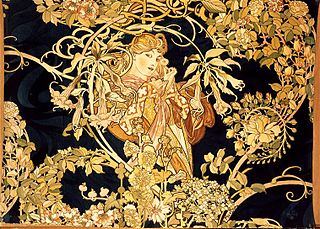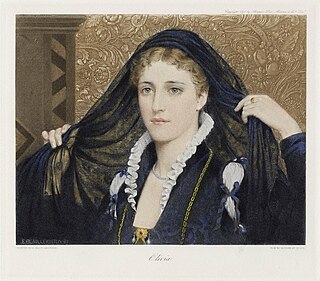
Turner is a common surname originating from Normandy, France, arriving in England after the Norman conquest with the earliest known records dated in the 12th century. It is the 28th-most common surname in the United Kingdom.

Bianca is a feminine given name. It means "white" and is an Italian cognate of Blanche. It is known in the Anglosphere as a character in William Shakespeare's The Taming of the Shrew. It came to greater notice beginning in the 1970s due to public figures such as Bianca Jagger.
Nadia is a female name. Variations include Nadja, Nadya, Nadine, Nadiya, and Nadiia. Most variations of the name are derived from Arabic, Slavic languages, or both.
Cheryl, occasionally spelt Cheryll, is a female given name common in English-speaking countries.
Caitlin is a feminine given name of Irish origin. Historically, the Irish name Caitlín was anglicized as Cathleen or Kathleen. In the 1970s, however, non-Irish speakers began pronouncing the name according to English spelling rules as KAYT-lin, which led to many variations in spelling such as Caitlin, Ceitlin, Catelynn, Caitlyn, Katlyn, Kaitlin, Kaitlyn, Katelyn and Katelynn.

Sarah is a common feminine given name of Hebrew origin. It derives its popularity from the biblical matriarch Sarah, the wife of Abraham and a major figure in the Abrahamic religions. It is a consistently popular given name across Europe, North America, and the Middle East — being commonly used as a female first name by Jews, Muslims, and Christians alike, and remaining popular also among non-religious members of cultures influenced by these religions.
Megan is a Welsh feminine given name, originally a diminutive form of Margaret. Margaret is from the Greek μαργαρίτης (margarítēs), Latin margarīta, "pearl". Megan is one of the most popular Welsh-language names for women in Wales and England, and is commonly truncated to Meg.
Natalie or Nathaly is a feminine given name of English and French origin, derived from the Latin phrase natale domini, meaning "birth of the Lord". Further alternative spellings of the name include Nathalie, Natalee, and Natalia/Natalija.

Rachel, meaning "ewe", is a feminine given name of Hebrew origin, popularized by the biblical figure Rachel, the wife of Israelite patriarch Jacob.

Emily is a feminine given name derived from the Roman family name "Aemilius", and is the feminine form of the name Emil.

Amber is a feminine given name taken from amber, the fossilized tree resin that is often used in the making of jewelry. The word can also refer to a yellowish-orange color.

Daisy is a feminine given name. The flower name comes from the Old English word dægeseage, meaning "day's eye". The name Daisy is therefore ultimately derived from this source. Daisy is also a nickname for Margaret because Marguerite, the French version of the latter name, is also a French name for the oxeye daisy.

Tiffany is a primarily English feminine form of the Greek given name Theophania. It was formerly often given to children born on the feast of Theophania, that is, Epiphany. The equivalent Greek male name is Theophanes (Θεοφάνης), commonly shortened to Phanis (Φάνης) and the female is Theophania (Θεοφανία) or Theophano (Θεοφανώ), colloquially Phani (Φανή).
The name Brooke is a female given name and less commonly a male given name, also used as a surname. Other forms include Brook. The name "Brooke" is of English origin.
Nina is a feminine given name with various origins and alternate spellings accordingly. Nina may also serve as a short form of names ending in "-nina/-ina", such as Clementina, Christina, or Giannina; it can also serve as a diminutive form of Anna.
Stacy, sometimes spelled Stacey, Staci, Stacie, or Stacii, is a common first name for women, and occasionally men.

Olivia is a feminine given name in the English language. It is derived from Latin oliva, olive. Both Oliva and Olivia were Latinate forms in use in English-speaking countries as early as the 13th century. Olive was in common use as a vernacular form. Though not invented by William Shakespeare, the name was popularized by a character in Twelfth Night.
Jessie is a given name in its own right, but may also be a nickname for the given name Jessica. It is generally considered the feminine form of Jesse. The name Jess is also a given name. It, or Jesse, may be used in Spanish as a nickname for the male name Jesus.
Tracy, as a British personal name, was originally adopted from Norman surnames such as those of the family de Tracy or de Trasci from Tracy-Bocage in Normandy, France. Derived from the Gaulish male name Draccios, or Latin Thracius, and the well-identified Celtic suffix -āko, such Norman surnames themselves sprung from several Tracy place-names in France.









